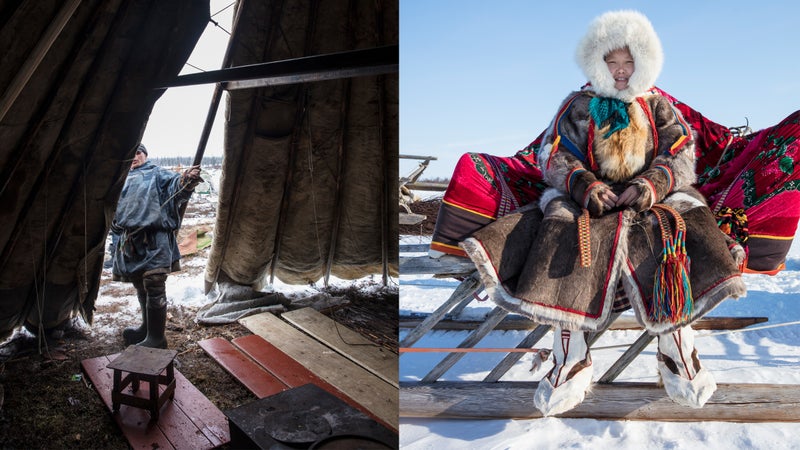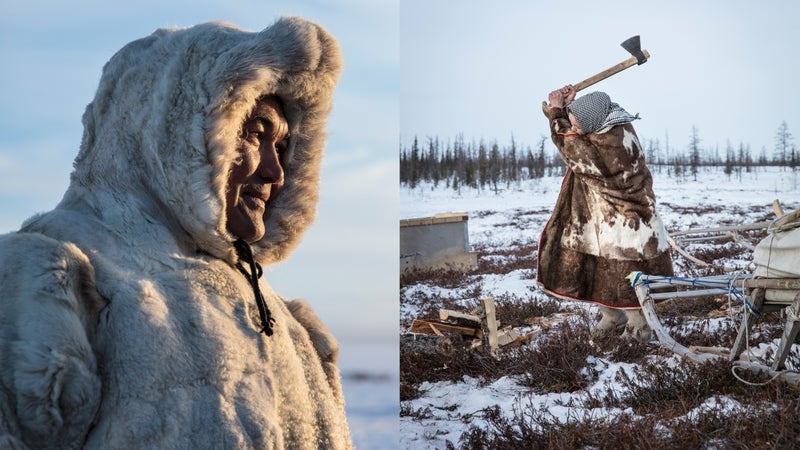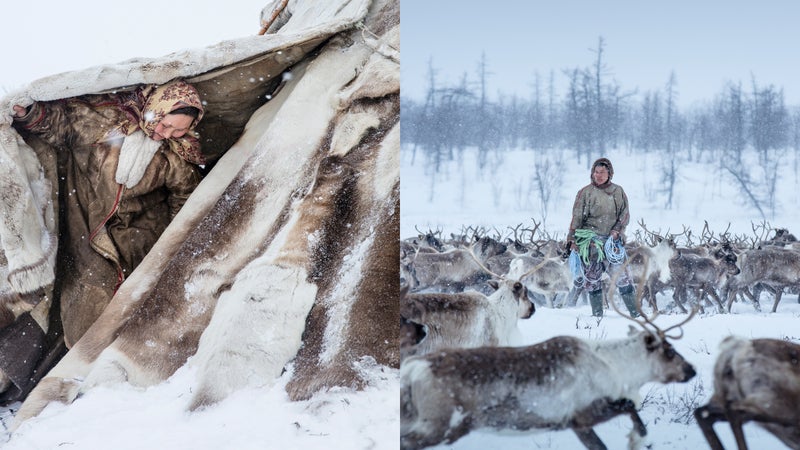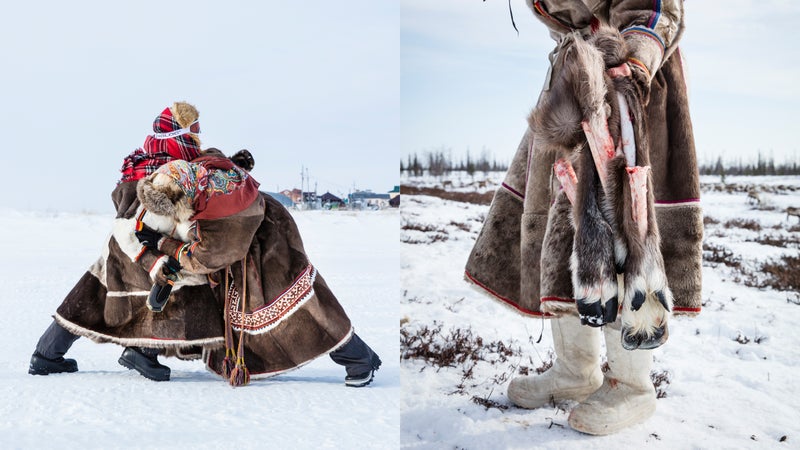Extreme Digital Detox, Siberia Edition
Last winter, the author ventured to the tundra with an extreme tour company promising the ultimate digital renewal—ten days living with nomadic reindeer herders in one of the planet’s last remaining off-the-grid dark spots. Is it really possible to totally unplug?
New perk: Easily find new routes and hidden gems, upcoming running events, and more near you. Your weekly Local Running Newsletter has everything you need to lace up! .
Alexey lies in his bed of frost-dusted furs, his breath rising in tendrils like woodsmoke.
In the ashen dawn light inside the chum, a reindeer-hide tepee, I watch slivers of snow slip through crevices at the tent’s apex around the stovepipe. Alexey’s wife, Rosa, clambers up from beside him, rips birch bark from branches stored beneath the stove to coax the embers to flame, then steps outside into a maelstrom of snow.
Download for your iPhone to listen to more longform titles.
A storm has blown in overnight, a complication for the Nenets, a tribe of reindeer herders who move their animals across Siberia’s frozen tundra twice a year. The 20-person group, six families known as Brigade 20, have been camped in the same exposed spot for three days with about 3,000 reindeer, and the animals have nearly exhausted the forage. They must cross the Gulf of Ob, a 30-mile-wide ice sheet that separates the Nenets’ winter and summer grounds, before the spring thaw. But March has been unseasonably warm, with temperatures hovering around freezing for the past week, and if conditions persist, the crossing could become perilous. Today’s objective is to close half the 15 miles to the southern gulf, but with the tundra suddenly turned opaque with falling snow, that seems unlikely.
“If you want to know the weather,” Alexey says, exiting, “you have to ask the sky.”
Two days earlier, I, along with 11 other paying tourists and three guides, joined the Nenets on a $4,646, ten-day trip that would take us as far away from the comforts of modern life as possible. Our outfitter, a British tour company called that organizes adventures to some of the planet’s most remote places, presented the journey as both an escape from the relentless grind of the West and an immersion into one of the world’s last nomadic cultures. The landscape, a roadless expanse of central Russia above the Arctic Circle, was daunting, but it was the cold that I found most intimidating. During our first night on the tundra, as we headed into the bleak wilderness with the temperature plummeting below zero, I realized that without the Nenets’ guidance, we’d likely freeze to death within hours.
Inside the chum, a few minutes after Alexey goes out to check the weather, I rise from my bed on the ground, slip the reindeer-fur cloak that I’ve been sleeping beneath over my head, then exit through the flap that serves as the front door. ���ϳԹ���, Alexey battles to keep his cigarette lit amid clots of wet snow blasting sideways. He motions me back inside. We aren’t going anywhere. Following Alexey’s lead, I cozy up under my furs. Even nomads take snow days.

Before Siberia, the best vacation I’d taken in a decade, since Apple released the iPhone, was a 2012 paddle trip through the Grand Canyon. It provided the anticipated natural wonder and river camaraderie, but it was something else that fed my soul: no service for ten continuous days.
As a travel writer, my work takes me all over the world, yet I’m as tethered to my phone as the most manic tech-startup founder. I file stories daily and constantly check e-mail to receive and coordinate assignments. Like many people these days, I unplug at my occupational peril. A few years ago, while traveling in Senegal, I stopped checking e-mail for a week, only to discover once I returned home that I’d missed an assignment in neighboring Mali.
In 2015, the , a global research firm, found that professionals now spend an average of 13.5 hours per day online interacting with work. Not surprisingly, this has many people desperate for breaks from connectivity, and entrepreneurs are eager to meet the demand. The loosely defined “digital detox” tourism field has mushroomed into a $440 billion industry that, by some definitions, encompasses everything from device-free workshops and weekend retreats to Gwyneth Paltrow’s wellness empire to hipster coffee shops that forbid Wi-Fi use.
Escape and rejuvenation have, of course, always been core promises of adventure travel, but many outfitters now promote the no-gadgets aspect of their experiences. Australia-based Intrepid Travel, one of the largest providers of small-group adventures in the world, has offered itineraries that ban phones for the duration of the trip. And at both the and Eco-Lodge in California and the in New York, customers must surrender their devices on arrival and don’t get them back until they leave.
“We are at the front edge of this trend,” says Shannon Stowell, CEO of the . “We’ve been hearing the term ‘digital detox’ for a while now, but our members first started selling it around 2016. These detoxes are going to become more prominent, because people desperately need them.”
Then there are outfitters like Secret Compass, which takes travelers so far off the grid that their phones are reduced to nothing more than cameras and flashlights. The company doesn’t bill its adventures as a chance to undergo a digital detox, but its most remote expeditions (including Siberia) automatically strip away our always-online habits and force clients to travel like locals, with just a few basic provisions. Tom Bodkin, Secret Compass’s founder, told me that he decided to offer these kinds of immersive experiences after watching clients on less ambitious journeys stumble down trails with enormous packs loaded with technical gear and digital equipment. The guides, meanwhile, got by with rucksacks and flip-flops. “All the extra shit gets in the way of appreciating the moment,” he says.
Forced austerity was exactly what I was after in Siberia. If anywhere could provide a guaranteed signal-free zone, it’s the land of whiteouts and gulags. But living with the Nenets promised much more than a break from e-mail and Facebook. Temperatures could dip to minus 40 degrees Fahrenheit, and we’d skip the down sleeping bags and Gore-Tex outerwear for reindeer-hide bedding and furs. The migration, I hoped, would be a complete immersion into a world without the pressures and trappings of modern life. It was a chance to go back in time to a simpler existence, if only for a little while.

The nomads are late. Despite the arranged 8 a.m. pickup, Sasha Khudi, 36, who the Nenets have sent to fetch our group, doesn’t roll up at our hotel in the booming Russian natural-gas town of Yar-Sale until after ten. We shuttle a few minutes across town in cars, expecting to arrive at a staging area where we’d be greeted by enthusiastic hosts ready to lead us into the wild. Instead we find ourselves in a deserted lot beneath dingy apartment blocks. Coming from the tundra, the Nenets’ priorities in the 7,300-person city are supplies and repairs, not escapist vacationers, and our hosts are running errands. My group mills around the scratch of yellowed snow for about six hours as the brigade gradually mobilizes.
Two days earlier, during the initial trip briefing at a cheerless airport hotel in Moscow, our lead guide, Patrick Barrow, made it clear that this would be no by-the-books tour. An Aussie who biked across Eurasia before settling with his wife in Kyrgyzstan, Barrow stressed the nomads’ fluid sense of time. “For the next two weeks, we’re at the Nenets’ whims,” he said, slapping the agenda on the table. “We should be back here on the first. It might be the fifth. Let’s hope it’s not later.”
In addition to Barrow, we have two Russian guides, Dmitry “Dima” Eskin and Evgeniy “Zhenya” Levishar. Six of our group’s paying clients are Australian: Rebekah Bell, a United Nations consultant living in Dhaka, Bangladesh; Kim Kitchener, a social worker from Sydney who hasn’t camped a day in her life; a gentleman who looks to be in his late fifties; and three millennial women who, along with a petite Brit of the same generation, are adopted into Sasha’s chum. An elder Belgian lawyer couple (who asked not to be named) have encyclopedic firsthand knowledge of the landscape we’re about to enter that is impressive when it’s not irritating. “Siberian outposts are gray and cold, with hotels like prisons,” the husband warns. But in Yar-Sale, flush with natural-gas money, the faux-wood lobby of our hotel is more Hilton Garden Inn than state penitentiary. There’s even Wi-Fi in the lobby.
Yamal, the name of the peninsula that stretches north to the Arctic Ocean, translates as “edge of the world,” and arriving here feels like tumbling over a precipice of time.
None of my fellow adventurers signed up for this trip expressly to escape their phones. The Belgian couple have traveled widely in Russia and love the north country; they’re chasing immersion and are toting 20 bottles of vodka as gifts. Kim is here as an anthropological “perv,” to observe an “unspoiled” culture. When I ask if anyone is excited to be without connectivity, one of the young women, Ellie, says, “Aw yeah, it’ll be good to get away,” as she taps away on her phone. The Aussie gentleman, who also didn’t want his name used, dismisses the idea of planning a trip around disconnecting. “Turn off your damn phone at home,” he says.
It’s past 4 p.m. by the time the Nenets have sorted gear and shoehorned us into their sledges, refrigerator-size plywood boxes on wooden runners that they pull behind snowmobiles or teams of reindeer for the 70-mile trip to our first camp, most of it over frozen tundra. My backcountry training screams that it’s reckless to set off in zero degrees with just a few hours until sunset. “In winter it’s always cold and dark,” says Sasha, who has a moon face and a persistent smile. “If we waited for light and warmth, we’d be three months behind the reindeer.”
The Nenets’ drivers throttle us away from the lot, and soon we’re bouncing over a pox of reindeer tracks at about 25 miles per hour. My spine shortens with each strike, and the blast of subzero air wrests ice crystals from my tear ducts. The Nenets stop every half-hour or so to smoke. Despite the disappearing sun, they lean on their snowmobiles and joke in their native language, more closely related to Finnish and Estonian than Russian. I chat with members of our group, who all seem as shell-shocked as I am. “Can you believe this?” Kim asks. Then, before I respond, she answers herself, “It’s unbelievable.” We’re in some of the planet’s emptiest wilderness, but so far I feel only wide-eyed and frazzled.
Four hours after motoring out of Yar-Sale, we rattle into the Nenets’ encampment, five chums lined up on a snowy knoll amid patchy stands of spruce. Smoke rises from the tents in twisted cords, and figures made round by layers of furs emerge at the hum of snowmobiles. Barrow stammers an introduction. The members of the brigade look as anxious as we do. The Nenets and their descendants have likely been at this icy fringe for at least 500 years, and we’re only the second group of Westerners to visit them. The children stare and point as if we’re apparitions. Yamal, the name of the peninsula that stretches north from the Gulf of Ob to the Arctic Ocean, translates as “edge of the world,” and arriving here feels like tumbling over a precipice of time.
Like most Nenets clans, Brigade 20 is a family unit, consisting of, in this case, three brothers, as well as an uncle, a cousin, and all the resulting kin and chaos. Secret Compass negotiated a contract with them to split our group of travelers between the brigade’s five chums, paying each subset of the family a hosting commission. Along with my wife—photographer Jen Judge—and our translator, Zhenya, I’m in chum five, the home of the cousin, Alexey Khudi; his wife, Rosa Yaptik; and their three-year-old daughter, Marianna. Their two elder children attend boarding school in Yar-Sale. Russian law says that every citizen must attend school, so starting at age six, the children are sent to the towns. Few Nenets make it through high school, though, and instead return to help their families with work.
For Brigade 20, that means herding reindeer across foraging grounds 400 miles north to the Kara Sea and then back each year. They raise the animals for meat, which is processed and packaged in nearby towns, then sold to supermarkets. The women make their family’s voluminous furs by hand—knee-length, hooded pullovers for men called malitsas and longer, front-laced versions for women called yagushkas. Each family crafts its own chum, built from up to 120 reindeer pelts stitched together with tendon and draped over a frame of pine logs. Alexey crafts the wooden sledges from timber he cuts, using carving knives he forged from metal trim off his snowmobile. When one of the vehicles dies on our second day in camp, the men convene and tinker till it fires; when they’re finished, rope and duct tape hold the engine together. “It’s not a question of whether you can do it,” says Pasha, the owner of the snowmobile. “You do it to survive.”

Life on the tundra is a constant stream of chores and tea and cigarette breaks, and we spend our first few days helping prepare for the crossing of the Gulf of Ob. My main job is fetching ice for meltwater. Rosa shows me how to use what looks like a whaling harpoon to chip aquamarine chunks from a nearby pond, then lug them half a mile back to camp on a plastic sled. I shovel snow into drifts around the chum walls to keep out the arctic wind. Alexey chops deadwood for me to split, but I’m terrible at it. He smiles as I repeatedly strike off-center, sending splinters flying.
When those things are finished, usually in the evening, we can relax in the chum, though even then there’s sewing and whittling to be done. Some of the Secret Compassers refuse the chores. But to me, the simplicity of a few existential tasks feels like the antidote to my wired life back home.
On the third day, the brigade slaughter a reindeer to share among the group. Two herders lasso an animal and kill it by strangulation, which preserves the pelt and prevents the blood from spilling. A few of the clients recoil from the butchering, but it’s done with great care. Every piece of the animal will be used. Even the bones are fashioned into hardware for reindeer harnesses.
To my great disappointment, I find that even here I can’t totally escape from the connected world. Most Nenets have a cell phone, though reception is patchy. On our first day in camp, Alexey and Rosa pulled out a laptop so Marianna could watch Masha and the Bear cartoons, causing me to grit my teeth in frustration—this was what I’d come nearly 5,500 miles to avoid. There’s an inescapable irony when Alexey, who sometimes shoots fowl to feed his family, plays a few rounds of Duck Hunt on his Nokia.
Of course, it’s easy to romanticize life without technology until you actually try to live without it. Though the Nenets still do much by hand, they depend on a few modern tools, including chainsaws to cut firewood and snowmobiles to herd the reindeer or make supply runs. The work is hard enough as it is; going back half a century to the days when the Nenets felled trees with hand saws and herded reindeer on wooden skis would make their existence significantly more difficult. “We could still live that way,” says Alexey, “but I hope we never have to.”
The day after the storm, we are finally ready to start moving. Military maneuvers are less complex than breaking down the camp. Imagine packing your extended family’s home onto 13 fridge-size sledges, where each item has an order in which it’s packed and a precise spot where it’s stowed, down to the wash pail that fits between the four legs of Rosa’s stool. Even with a predawn start, it takes until midmorning to complete. By the time the sledges are hitched behind the reindeer, it’s after noon.
We travel six miles under a glassy cobalt dome of sky and pass through open snowy country broken by skeletal trees with black, winter-deadened foliage. Four hours after setting out, the brigade reconstructs the camp in a virtual rewind of the morning’s packing, and the silvery cape of dusk has already settled before we’ve erected the chum. Inside, I sag from fatigue. It’s daunting to think that the brigade does this every few days. We’re only halfway to the Gulf of Ob. “Pack long, ride fast,” goes an old Russian saying. It feels like the Nenets got only the first half of the memo.
That night, after finally slumping down to hot reindeer stew, Alexey pulls out his phone for a few rounds of Duck Hunt—respite from the difficulties and tedium of tundra life.
The morning we’re to cross the Gulf of Ob dawns windless, sharp, and bright. The weather is auspicious, but Rosa and Alexey speed through packing and the men are unsmiling and tense at the roundup. The other Secret Compass guests and I try to help, but this time it feels like our bumbling is less endearing than jeopardizing. The 30-mile crossing offers no forage for the reindeer and no escape from a surprise storm. Three years ago, a blizzard struck during the migration, and the strafing winds and thick snow pinned down Alexey and a few of the others for 48 hours with nothing but their furs for cover. Almost a quarter of the herd perished from exposure and starvation.
This year the brigade has a plan to prevent such calamity. Chums one and five will make the full crossing with the main herd, about 2,300 animals. The rest of the camp will move the 700 working bulls to an island halfway across the ice, where there’s shelter to overnight. Tomorrow, those of us who have (hopefully) reached the far bank will backtrack on snowmobiles to help the others complete the migration.
We slide down the riverbank and onto the Gulf of Ob, a brutal ice desert with wind-carved snow dunes that merge seamlessly into the pale sky. The column of nomads on their overloaded sledges snakes more than a mile to the horizon and out of sight. On the back of a sledge driven by a 19-year-old herder named Yarik, I glide toward the distant shore at a pace I could almost walk. I fall into a trance from the hiss of the runners through the snow and the click of reindeer hooves.
The weather holds, and our group reaches the bank before nightfall. Alexey is relaxed again and smiles as I sweat through another pitiful firewood-chopping session. He tells me that I’m improving, though I’m still not as good as his ten-year-old son, Efim. Rosa makes a pot of stew for dinner, and the chum is as homey as it has been in eight days.
Reality blows in at dawn. A storm has risen overnight, and there are concerns about the remainder of the brigade. Under iron skies and a torrent of snow, we motor across the open ice to the others, guided by a dash-mounted GPS. Normally, Alexey pads the snowmobile-drawn sledge with furs, but in this morning’s rush he forgot, so we’re sitting on bare plywood, and each icy impact jars like a miniature car crash.
The rest of the group is OK, if exhausted from 14 hours of migration the previous day. Once we arrive the storm slackens, and our extra hands make loading and travel smoother, though the cold still bites. By evening the brigade is reunited on the north bank of the Ob. For the Nenets, it was mostly an easy crossing. For me, it was a brief chance to witness the brutality of life in Siberia.

In the morning, as Brigade 20 prepares to continue north to the Arctic Sea, I get ready to return to civilization. There is no fanfare—the Nenets believe that saying goodbye is bad luck. An hourlong snowmobile ride gets us back to town, and our Secret Compass crew reconvenes in the sterile hotel in Yar-Sale. After ten days in the tundra, the forced-air heating and the gas fire in the lobby seem like magic. Cell phones and iPads materialize from bags within minutes. Before we’ve received room keys, the millennials are checking e-mail and updating Facebook. “Four-hundred seventy-four e-mails!” cries Ellie. Most of the forty-to-sixtysomethings refuse to plug in. “I have three days that are still mine,” says my wife.
I leave my phone off, too. I’ll take a few more days of respite before returning to work life back home, where I’ll once again start days at dawn on my laptop and end them near midnight replying to e-mail from my cell phone in bed. There’s no real off switch to that routine, but Siberia reminded me of the importance of pressing pause. We’ll have lost something as human beings if we forget how to disconnect.
Coming home, I’ve committed to one day a week without service, lost assignments be damned. Even on weeknights when I must chip away at the inbox, it’s sobering to know that somewhere north of the Arctic Circle, Alexey and Rosa are pushing their sledges over patchy snow, as the Nenets have done for hundreds of years.
“After your long travels, you’ll go home and we’ll go north,” Rosa told me as I packed up on the last day in the chum. “We will never be able to imagine the place you come from.”
At least not until we become Facebook friends.
Aaron Gulley () writes the Cycle Life and Modern Nomad columns for ���ϳԹ��� Online.


